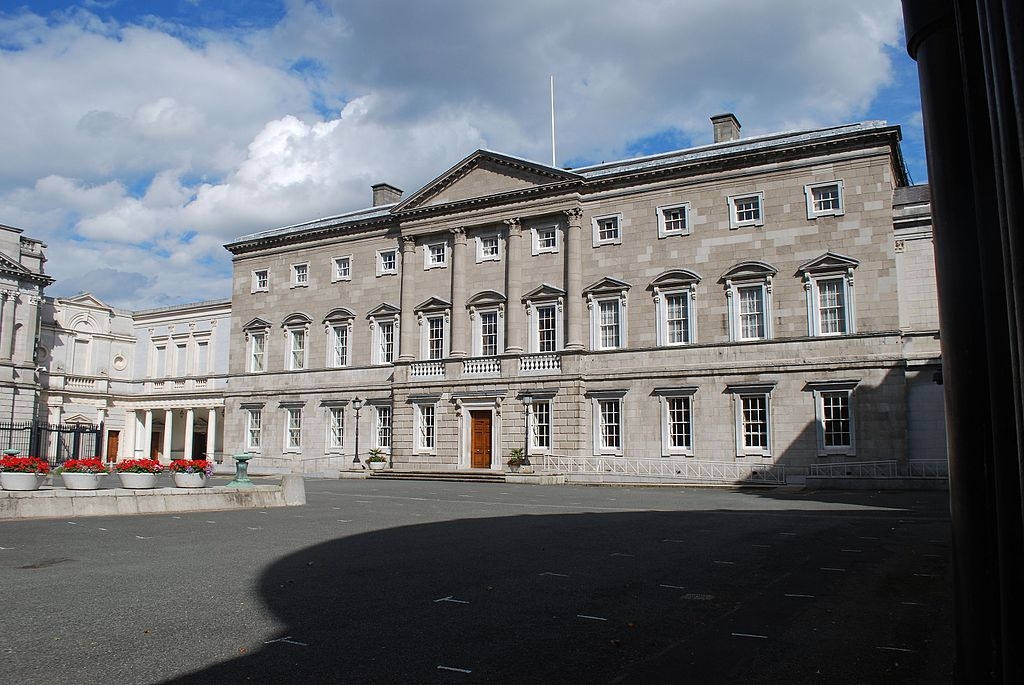 Leinster House in Dublin, Ireland, the seat of the Irish Parliament. (Image source: Jean Housen/Wikimedia Commons) |
Irish Prime Minister Leo Varadkar and his governing Fine Gael party oppose a bill that would make it a crime for Irish citizens to import or sell anything produced by Israelis in Judea and Samaria (the West Bank). Varadkar may wisely be pressuring politicians who voted in favor of the Control of Economic Activity (Occupied Territories) Bill to examine the possible negative consequences for Ireland's national interest if the bill becomes law.
The bill, introduced by Irish Senator Frances Black and crafted to impose a prison term of up to five years or a 250,000 euro fine on any Irish citizen who violates it, is now being studied by a joint committee of both houses of the Irish legislature. Varadkar's party is likely counting on arguments submitted by Irish organizations opposed to the bill to persuade some of its supporters to reconsider their initial vote. In addition, Perhaps Varadkar and Fine Gael will be able to persuade enough of the 14 abstaining senators in the Upper House -- where the vote in July 2018 was 25-20 in favor, and in late January 2019 in the Lower House (Dáil) 75-45 in favor -- to oppose it.
All of the major opposition parties -- the Fianna Fáil, Sinn Féin and the Independents -- back enactment of the legislation. Recently, a group of Irish activists urged Ireland to boycott the 2019 Eurovision song contest, hosted by the Jewish state this year.
One leading supporter of the bill is Gerry Adams, the former head of Ireland's Sinn Féin, the political wing of the Irish Republican Army (IRA), which used terrorist tactics to try to force the British out of Northern Ireland. Adams has previously called for the expulsion of Israel's Ambassador to Ireland for Israel having tried to prevent its border being breached -- with the purpose of Israeli soldiers and civilians kidnapped or killed -- in violent efforts organized regularly for more a year by the Hamas government of the Gaza Strip.
The chief government figure opposing the bill is Foreign Minister Simon Coveney. Coveney argues that Ireland risks its standing in the European Union because the bill is legally unsound. He is correct. A Brussels-based EU trade official warned the Irish government that "the bill would be in contravention of EU competence on trade matters," as the EU Commercial Treaty demands uniformity in member-state trade policies. In addition, in a position paper submitted to the Irish Legislature's Joint Committee on Foreign Affairs and Trade by the Ireland Israel Alliance (IIA), the New York-based Lawfare Project claims "draws attention to potentially huge losses of US tax benefits for US companies with subsidiaries in Ireland, if the Bill is passed into law. This could potentially lead to major US companies pulling out of Ireland, and for other companies who were considering relocating, to not do so."
Irish politicians who passed it would likely be regarded as racist, particularly in view of the German Parliament's recent resolution to designate BDS (the Boycott, Divestment and Sanctions movement against Israel) as anti-Semitic. The bill may also may well hurt Ireland's effort to secure a position on the UN Security Council (UNSC) in the 2020-2021 vote by regional member-states in the General Assembly. Canada and Norway are competing with Ireland for the two seats allotted to the UNSC's West Europe/North America region. Dublin may be concerned that the United States and other allies of Israel within the West Europe/North American caucus will mobilize against Ireland in the UNSC vote.
Opponents of the proposed bill are trying to marshal arguments to demonstrate that it will have a negative impact on Ireland's economic interests.
The Ireland Israel Alliance, with chapters in the Republic of Ireland and Northern Ireland, is a prominent pro-Israeli lobby group fighting the bill, on the grounds that the legislation it will harm the interests of Palestinians -- an estimated 30,000 of whom are employed by Israeli businesses in the West Bank. The lobby claims that these workers are paid "much higher salaries than they would obtain in the Palestinian Authority."
The IIA also accuses the bill's supporters of hypocrisy, and cites their failure to condemn analogous situations in which Irish firms invest in international companies that do business in other occupied territories around the world. In a review in the American Thinker of Martin Blecher's book, Israeli Settlements: Land Politics Beyond the Geneva Convention, Michael Curtis cites specific examples of the higher moral standard to which Israel is held, in contrast to situations such as Russia's occupation of Ukrainian Crimea and parts of Georgia and Moldova, Turkey's occupation of Northern Cyprus and Morocco's occupation of the Western Sahara.
It is not merely that Israel is held to a higher standard than other countries, however, which makes the above underlying assumption inapplicable. More importantly, the territories occupied in 1967 were taken in a victory over aggressive Arab-state invaders determined to wipe Israel off the map. While the Arab-initiated wars against Israel stem from a collective failure to abide by the 1947 United Nations Partition Plan for Palestine, Britain's eight-century-long occupation of Ireland, for example, was an effort to integrate into the home country all Irish land -- to which the UK had no legal claim – and to erase Irish culture, eradicate Irish religious traditions and suppress Ireland's language. This may help to explain why the Irish political class identifies with the Palestinians, albeit mistakenly, and lean towards supporting a bill that really is not in Ireland's interest, the Palestinians' interest or anyone's interest.
Dr. Lawrence A. Franklin was the Iran Desk Officer for Secretary of Defense Rumsfeld. He also served on active duty with the U.S. Army and as a Colonel in the Air Force Reserve.


